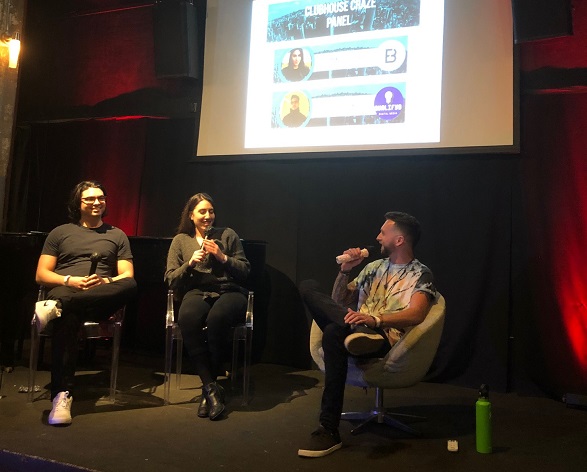“Clubhouse Craze” Explored at Jersey City Tech Meetup
Following a year of pivoting to online, remote-only events due to the pandemic, Ben Yurcisin’s Jersey City Tech Meetup (JCTM) dipped one toe tentatively back into the water of live, in-person hosting on February 23 by organizing its first-ever hybrid event, called “Clubhouse Craze.”
“I missed the energy in the room of having in-person events,” said Yurcisin, as he enthusiastically set the stage for the evening’s proceedings.
Approximately half the attendees (including yours truly) were seated at tables in the appropriately COVID-compliant and socially distanced audience at Headroom LGBTQ+ Lounge (150 Bay Street, Jersey City). The rest were remotely watching a live streaming version of the Meetup.
Headroom is a recently revamped and expanding downtown performing arts venue owned by Joseph Cameron, a coproducer of many past JCTM events. Cameron also specializes in digital marketing and social advertising services.
For those not keeping tabs on the latest viral social media platforms and/or living in an Android, non-iOS world, Clubhouse may be a somewhat foreign concept, as the app is presently only available to Apple hardware users.
It has, in fact, been growing by leaps and bounds since its debut approximately a year ago, when the worldwide pandemic was in its early days. Founded by entrepreneurs Rohan Seth and Paul Davison, Clubhouse was already being valued at $100 million by May 2020. According to Crunchbase, the company has raised $110 million to date, including a Series B round that closed in late January 2021.
Air of Exclusivity
Clubhouse manages to maintain an air of exclusivity, as new “members” must be invited by a current Clubhouse member before they are officially onboarded. Individual profiles show who invited you and when.
This, of course, sounds like a digitized version of the vetting process many go through to join a country club, so, in that respect, the app’s name seems appropriate.
Clubhouse self-identifies as an invite-only drop-in iOS-based audio chat. The audio-only sets it apart from many leading social media platforms, which are increasingly encouraging video content. TikTok is a prime example of a viral, video-centric app.
As you will see below, there are lots of good reasons to join and participate on Clubhouse, but you must be prepared for some of the bad behavior and inauthentic behavior that goes on.
Panelists/Clubhouse Users:
Alex Eick, founder and CEO (“culture & elevation officer”) of Qualifyd Media (Princeton) – leading brands on a journey to impact audiences, and finding blind spots for business owners seeking to lead by EQ (emotional intelligence). On Clubhouse, connect with him via @alexeick.
Summer Elsayed – mental health advocate, director of social impact for a tech company, as well as a triathlete. Her Clubhouse profile: @summerelsayed.
One of the things that makes Clubhouse interesting, but also somewhat hard to explain to the uninitiated, is that there are many rooms and simultaneous discussions happening on the platform, and they are typically on a wide range of topics. Based on an individual members’ preferences when they first register, the app pushes suggestions of various discussions for the users to attend.
It is entirely possible that Alex’s and Summer’s business and personal interests may intersect on certain subject matter(s), and they would find themselves in the same room and either actively (as a moderator or speaker) or passively (in listen-only mode) participating.
It is also highly likely that they would be engaging in vastly different Clubhouse content — Alex focusing on marketing and business-oriented rooms, while Summer would participate in wellness and/or mental health discussions.
Panel Highlights
A sampling of Clubhouse panel highlights, including some additional background info on the app:
- At its simplest level, imagine Clubhouse as an opportunity to chat and network with people — likeminded or otherwise — from all over the world. These conversations occur live in rooms and on stages, and are not (legally) recorded for future airing.
- This is different from many other channels, which are more passive, as content/posts are typically viewed by the audience at a later date.
- If you are not a designated moderator of a given room, in some cases you can electronically raise your hand to be invited to join the discussion.
- As mentioned above, there is no video on Clubhouse.
- Members are strongly encouraged to use their real names when they create their accurate and authentic profile. This can contain your picture or a preferred avatar, as well as one’s Twitter and/or Instagram handles.
- “Resetting the room” is a common phrase heard on Clubhouse. This is done as a courtesy to new participants that may enter the room midstream, and is an opportunity for the moderator(s) to provide further context to the present conversation and make any newcomers feel welcome.
- Advice from Summer: “Read the room” by listening in before trying to jump on-stage, assuming this is a room with other Clubhouse members that you have not previously interacted with.
- Some well-known celebrities — including business professionals and entertainers — occasionally make appearances.
- Some recent examples: Elon Musk, Bill Gates, Mark Cuban and Tiffany Haddish. For some reason, there are no checkmarks to authenticate profiles, as you might find on Twitter, for example. As a result, there are presently nine people with the name Elon Musk on Clubhouse. The real one appears to be @elonmusk, with 2 million listed followers.
- There is a definite FOMO (fear of missing out) factor linked to Clubhouse. It can suck you in, at least initially; and you may feel that, if you leave, you may miss out on valuable info being exchanged.
- Alex lauded Clubhouse for being a platform where he has won lots of client engagements and new business opportunities (for website work), as he was early to join — “when attention was cheap,” he opines.
- When done right, Clubhouse can foster a community of business networking on steroids.
- Unfortunately, he eventually experienced burnout from spending too much time with the app.
- Now, he consciously monitors and limits his daily time to two hours maximum.
- Summer spoke of mentioning to other members in a room that she was hoping to connect with someone from the United Nations. Amazingly, word got around extremely fast and she was introduced to someone that same day.
- One of the negatives is that she got distracted due to having too many notifications set (reminders of new discussions taking place or scheduled for a future date), which she cautions against.
- The Clubhouse algorithm seems to be curated so that it, not surprisingly, motivates users to spend more time on the app, to create “stickiness.” If you are hanging in the hallway (between rooms), it will often proactively push notifications to motivate you to join a particular discussion room.
- People have been successful in building communities on Clubhouse.
- It is often readily apparent early on whether you will get along with other participants in a particular room by listening to the conversations and how people interact.
- Various power structures are being formed on Clubhouse, according to the panelists.
- There is a lot of experimentation going on, with people strategizing how to best leverage or monetize their participation.
- Clubhouse strives to be an inclusive space, but one that is built on exclusivity.
- Many active users are good at remembering stories fellow participants previously shared, and this often drives regular attendees to regularly convene together in specific rooms over time.
- Clubhouse room conversations can apparently go on very long — even days — as room moderators keep changing, with various attendees coming and going.
- Sadly, there appears to be an undercurrent of “cancel culture” on Clubhouse, according to the panelists, which disturbingly plays out live.
- Some members practice willful ignorance on Clubhouse. They likely know better, but seemingly don’t care how their bad actions and poor behavior impacts others.
- It is a challenge to authenticate or fact check other members’ reputations or credentials in their profiles, or as verbally stated, when they are moderating or on stage.
- Clubhouse appears to be working on creators’ grants to reward certain people.
- Expect to see more paid admissions for premium events in the future.
- Also, more fundraising for charitable causes.
- Summer expects Clubhouse to become more performative over time, and less about connection.
- She recommends setting your intentions and expectations before joining.
- At its best, Clubhouse facilitates starting positive and mutually beneficial online connections and conversations on the app, and then bringing them offline into the real world.
If you are already a member or decide to join Clubhouse, check out Ben Yurcisin’s “Coffee Time with Ben,” on Fridays, at 11 a.m.
To watch past JCTM sessions – click here to access its YouTube channel.
The next JCTM meeting covers “Women in Cannabiz,” a timely topic, reflecting recently passed New Jersey legislation. It will be streaming only, on March 16 at 6:30 pm.




